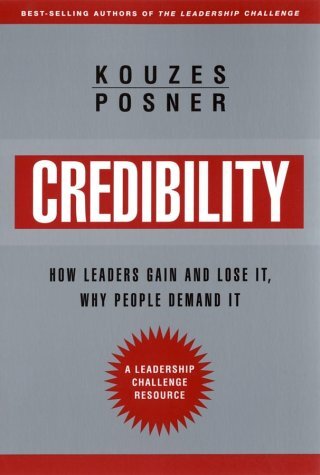James M. Kouzes and Barry Z. Posner, Credibility: How Leaders Gain and Lose It, Why People Demand It. Revised Edition. Jossey-Bass, 2003.
Referenced in:
LifeandLeadership.com Summary
This is the second edition of a business classic coming out of the authors’ extensive research which asked thousands of people the question, “What qualities are most looked for an admired in leaders, someone whose directions others would willingly follow?” The result was a clear and strikingly consistent message about the qualities leaders must demonstrate if they want others to enlist voluntarily in a common cause and to commit themselves to action freely. They conclude: “According to our research, the majority of us look for and admire leaders who are honest, forward-looking, inspiring, and competent.” (13) This is no less true for the millennial generation, as revealed in the authors’ updated research in The Truth About Leadership. The rest of the book is a description of the components of character development, along with several exercises to help in that quest. They describe six disciplines of credibility: discovering yourself, appreciating constituents and their diversity, affirming shared values, developing capacity, serving a purpose, and sustaining hope. These exercises are expanded in the companion workbook, Strengthening Credibility: A Leader’s Workbook. Together, these resources are regarded as one of the most effective secular resources on character development for leaders.
The authors contend that “Leadership is a reciprocal relationship between those who choose to lead and those who decide to follow,” and that such reciprocity is achieved only when leaders earn and maintain credibility. It is based on extensive and well-documented research as to what people “look for and admire in a leader, someone whose direction they would willingly follow.” They discovered four characteristics ranked well above the rest — honest, forward-looking, inspiring, and competent. These are strikingly similar to the ancient Aristotelian model of ethos (honesty, trustworthiness), pathos (forward-looking, inspiring, dynamic), and logos (competence, expertise). They also discovered six disciplines that lead to the development of these three currencies: discovering yourself, appreciating your constituents, affirming shared values, developing capacity, serving a purpose, and sustaining hope. Each of these disciplines is developed in detail.
“Credibility, like reputation, is something that is earned over time. It does not come automatically with the job or the title. It begins early in our lives and careers. People tend to assume initially that someone who has risen to a certain status in life, acquired degrees, or achieved significant goals is deserving of their confidence. But complete trust is granted (or not) only after people have had the chance to get to know more about the person. The credibility foundation is built brick by brick. And as each new fragment is secured, the basis on which we can erect the hopes of the future is gradually built.” (1993: 25)
From the Publisher
“Leadership is personal. It’s not about the corporation, the community, or the country. It’s about you. If people don’t believe in the messenger, they won’t believe the message. If people don’t believe in you, they won’t believe in what you say. And if it’s about you, then it’s about your beliefs, your values, your principles.”— from Credibility
In this best-selling book, Kouzes and Posner (authors of The Leadership Challenge), explain why leadership is above all a relationship, with credibility as the cornerstone. They provide rich examples of real managers in action and reveal the six key disciplines and related practices that strengthen a leader’s capacity for developing and sustaining credibility. Kouzes and Posner show how leaders can encourage greater initiative, risk-taking, and productivity by demonstrating trust in employees and resolving conflicts on the basis of principles, not positions.
About the Authors
James M. Kouzes is chairman emeritus of the Tom Peters Company and an executive fellow at the Center for Innovation and Entrepreneurship at the Leavey School of Business, Santa Clara University. Barry Z. Posner is dean of the Leavey School of Business and professor of leadership at Santa Clara University.
Kouzes and Posner are the coauthors of The Leadership Challenge, Encouraging the Heart, and The Leadership Challenge Planner. They also developed the highly acclaimed Leadership Practices Inventory (LPI) and LPIOnline.com, 360-degree assessment tools based on the Five Practices of Exemplary Leadership.
***For additional information on this resource, including reviews, click the bookstore links. Check the reference at page top or the links below for resource guides on related topics.***
Related Areas
See Other Resources on Leadership Development:
See Other Resources on Leadership:
See Resources on Over 100 Ministry Topics:


